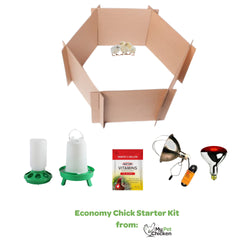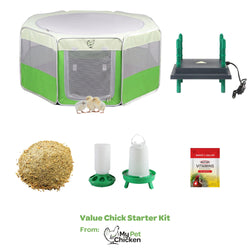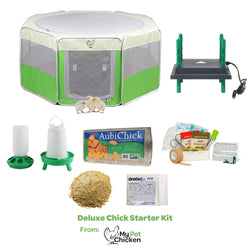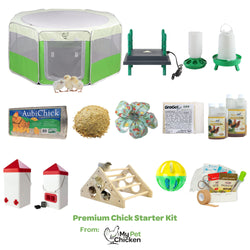All about Botulism in poultry
Back to blog
Chickens seem to be able to ingest just about anything, don't they? But if they contract the Clostridium botulinum bacteria while foraging or by eating contaminated feed, they can get botulism, which is also known as food poisoning. Butulism is more or less dangerous, depending on how much of the contaminated food they ingested. Thankfully, this issue is rare, and there are steps you can take to protect your flock. Read on to find out more:
Botulism Also called
Food poisoning
Prevalence
Infrequent
Signs
General signs -
Fatigue, weakness, ruffled feathers, diarrhea, sudden death
Cardinal or diagnostic signs -
Neurological symptoms, including flaccid (floppy, not stiff) paralysis of limbs and neck, eyes partially closed, shaking or trembling, stumbling, torticollis (wry neck). Your vet may be able to determine what was eaten from an analysis of crop or stomach contents.
Cause/s
Eating rotten or spoiled food contaminated with Clostridium botulinum bacteria, or eating bugs or grubs (particularly maggots) that have been feeding on contaminated material, or drinking from water/eating feed soiled with botulism-containing matter, such as dirty litter. It is not actually the bacteria that causes an infection; instead, it is the toxin produced by the bacteria which causes poisoning. The type that affects poultry needs warm temperatures to reproduce, so most cases occur in summer and fall.
Communicability
Not passed from bird to bird, but if your flock is eating/drinking from the same source/s, several or all might come down with botulism at once.
Communicability to humans
No. Humans can suffer from botulism from consuming spoiled food, but it is not passed to them by pet chickens. In addition, chickens are generally affected by a different type of botulinum bacteria than humans are, although there is rarely some overlap. That said, be sure to practice good biosecurity and wash hands after contact with your chickens (the same way you would with any pet), to prevent inadvertently putting soiled hands in your mouth.
Incubation period
Depends on the amount of toxin eaten.
Latent
No.
Endemic
Various botulism-causing bacteria are found nearly everywhere; however, they multiply chiefly in wet, rotting organic matter. This includes compost piles, where chickens often like to scratch.
Home treatment and/or prevention
Prevention: Practice good biosecurity. Keep coop clean and dry. If litter gets wet, remove it before bacteria can proliferate. Iodine is a good sanitizer for this bacteria. Control flies by keeping coop and run clean. Vaccines may be available in some areas, but are not generally practical unless you know there is a source nearby (in a neighboring yard or area) that you have no control to clean up.
Treatment: Home treatment is complicated, but can be managed by flushing your pet�s crop several times a day with an Epsom salts or molasses solution. Home flushing can be dangerous, because it is easy for an inexperienced person to accidentally cause the solution to be aspirated and drown the bird.
Veterinary care
Your vet may be able to provide an antitoxin injection, or provide detailed instructions and even a demonstration of flushing.
Recovery
How a bird will respond to treatment will depend on the amount of �poison� ingested, and on how quickly the problem was identified and treatment began. If small amounts were ingested, the bird may recover spontaneously. If large amounts were consumed, the bird may die too quickly for treatment.
Other conditions, illnesses and/or diseases with similar signs:
Marek�s Disease also causes leg paralysis. Other types of poisoning may show similar signs.
Also consider browsing through this list of other chicken illnesses with neurological symptoms.
Botulism Also called
Food poisoning
Prevalence
Infrequent
Signs
General signs -
Fatigue, weakness, ruffled feathers, diarrhea, sudden death
Cardinal or diagnostic signs -
Neurological symptoms, including flaccid (floppy, not stiff) paralysis of limbs and neck, eyes partially closed, shaking or trembling, stumbling, torticollis (wry neck). Your vet may be able to determine what was eaten from an analysis of crop or stomach contents.
Cause/s
Eating rotten or spoiled food contaminated with Clostridium botulinum bacteria, or eating bugs or grubs (particularly maggots) that have been feeding on contaminated material, or drinking from water/eating feed soiled with botulism-containing matter, such as dirty litter. It is not actually the bacteria that causes an infection; instead, it is the toxin produced by the bacteria which causes poisoning. The type that affects poultry needs warm temperatures to reproduce, so most cases occur in summer and fall.
Communicability
Not passed from bird to bird, but if your flock is eating/drinking from the same source/s, several or all might come down with botulism at once.
Communicability to humans
No. Humans can suffer from botulism from consuming spoiled food, but it is not passed to them by pet chickens. In addition, chickens are generally affected by a different type of botulinum bacteria than humans are, although there is rarely some overlap. That said, be sure to practice good biosecurity and wash hands after contact with your chickens (the same way you would with any pet), to prevent inadvertently putting soiled hands in your mouth.
Incubation period
Depends on the amount of toxin eaten.
Latent
No.
Endemic
Various botulism-causing bacteria are found nearly everywhere; however, they multiply chiefly in wet, rotting organic matter. This includes compost piles, where chickens often like to scratch.
Home treatment and/or prevention
Prevention: Practice good biosecurity. Keep coop clean and dry. If litter gets wet, remove it before bacteria can proliferate. Iodine is a good sanitizer for this bacteria. Control flies by keeping coop and run clean. Vaccines may be available in some areas, but are not generally practical unless you know there is a source nearby (in a neighboring yard or area) that you have no control to clean up.
Treatment: Home treatment is complicated, but can be managed by flushing your pet�s crop several times a day with an Epsom salts or molasses solution. Home flushing can be dangerous, because it is easy for an inexperienced person to accidentally cause the solution to be aspirated and drown the bird.
Veterinary care
Your vet may be able to provide an antitoxin injection, or provide detailed instructions and even a demonstration of flushing.
Recovery
How a bird will respond to treatment will depend on the amount of �poison� ingested, and on how quickly the problem was identified and treatment began. If small amounts were ingested, the bird may recover spontaneously. If large amounts were consumed, the bird may die too quickly for treatment.
Other conditions, illnesses and/or diseases with similar signs:
Marek�s Disease also causes leg paralysis. Other types of poisoning may show similar signs.
Also consider browsing through this list of other chicken illnesses with neurological symptoms.



